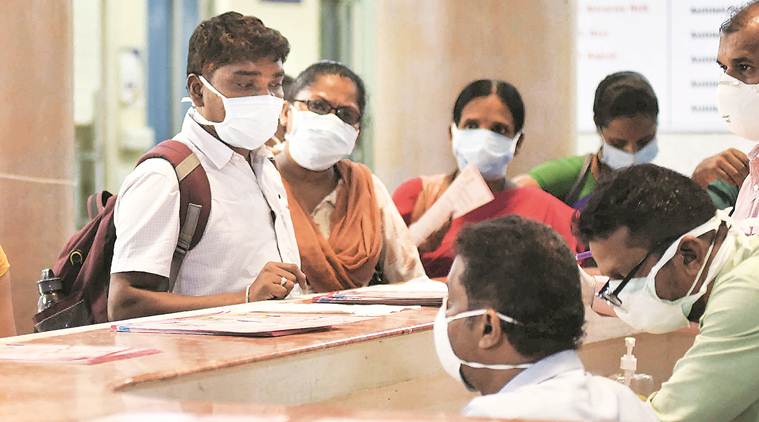 “General population can use folded cotton handkerchief for self-protection… it can be reused by keeping it in bleach solution or hot water for half-an-hour, followed by thorough washing,” stated the advisory. (Representational image)
“General population can use folded cotton handkerchief for self-protection… it can be reused by keeping it in bleach solution or hot water for half-an-hour, followed by thorough washing,” stated the advisory. (Representational image)
Five people with suspected symptoms of the novel coronavirus (COVID-19) were admitted to Naidu hospital in Pune on Wednesday. Three of them had visited South Korea recently, while the other two had travelled to Italy, according to officials of the Pune Municipal Corporation (PMC).
South Korea and Italy are among the countries worst affected due to the COVID-19 outbreak.
The five latest admissions take the total number of people who have been examined in Pune to 80, PMC said. All the earlier 75 have tested negative for the infection and have been discharged. The PMC said the five admitted on Wednesday were ‘stable’.
Amidst a sudden rise in the number of affected people in India in the last couple of days, the Maharashtra government on Wednesday put out an advisory for its citizens. It said the general public need not start using masks at the moment, but should use folded cotton handkerchief for self-protection.
“For the general population, it is not essential to use masks at the current moment. In fact, masks come with their own hazards. For a person with an existing medical condition, wearing a mask may inadvertently complicate the situation. Many experts have noted that people may wear a mask incorrectly, and they can increase the risk of infection by touching their face more often,” the state government advisory said.
It also said that ‘inadvertent disposal of masks’ was a ‘biomedical risk for the society’.
“General population can use folded cotton handkerchief for self-protection… it can be reused by keeping it in bleach solution or hot water for half-an-hour, followed by thorough washing,” stated the advisory.
The advisory said the masks should be used by only those who had a history of travel to the affected regions of the world — China, Italy, South Korea, Iran and other affected countries — or who have had contact with known infected people, or those who were showing symptoms of the disease. Medical personnel were advised to use masks.
The World Health Organisation (WHO) also asked countries in the region to strengthen their preparedness and be ready for all eventualities.
“Top priority of the countries should be to be ready to roll out speedy response to the first case, first cluster, and first evidences of community transmission. Early containment measures can help countries stop transmission,” said Dr Poonam Khetrapal Singh, regional director of WHO South-East Asia region.
Five of the 11 countries in the South-East Asia region have confirmed COVID-19 cases. Thailand has so far reported 43 positive cases, India has 28, Indonesia two, while Sri Lanka and Nepal have reported one positive case each, according to the WHO statement.
“The risk of the new coronavirus is very high across the world and in the WHO South-East Asia Region. More cases can be expected. Rapidly identifying these cases, isolating them and following their contacts are important initiatives to help limit person-to-person transmission. The speed of our response is critical, which is only possible if we are prepared,” said Khetrapal Singh.
She said the virus could cause mild, flu-like symptoms as well as more severe disease. Patients show a range of symptoms such as fever, cough, and shortness of breath. Based on current data, globally 81 per cent of cases seem to have mild disease, about 14 per cent appear to progress to severe disease, and some 5 per cent are critical.
“People can protect themselves and prevent spread of the virus by practicing hand hygiene, covering their cough and sneeze, maintaining distance from others if they are sick and from those who are sick,” she said.